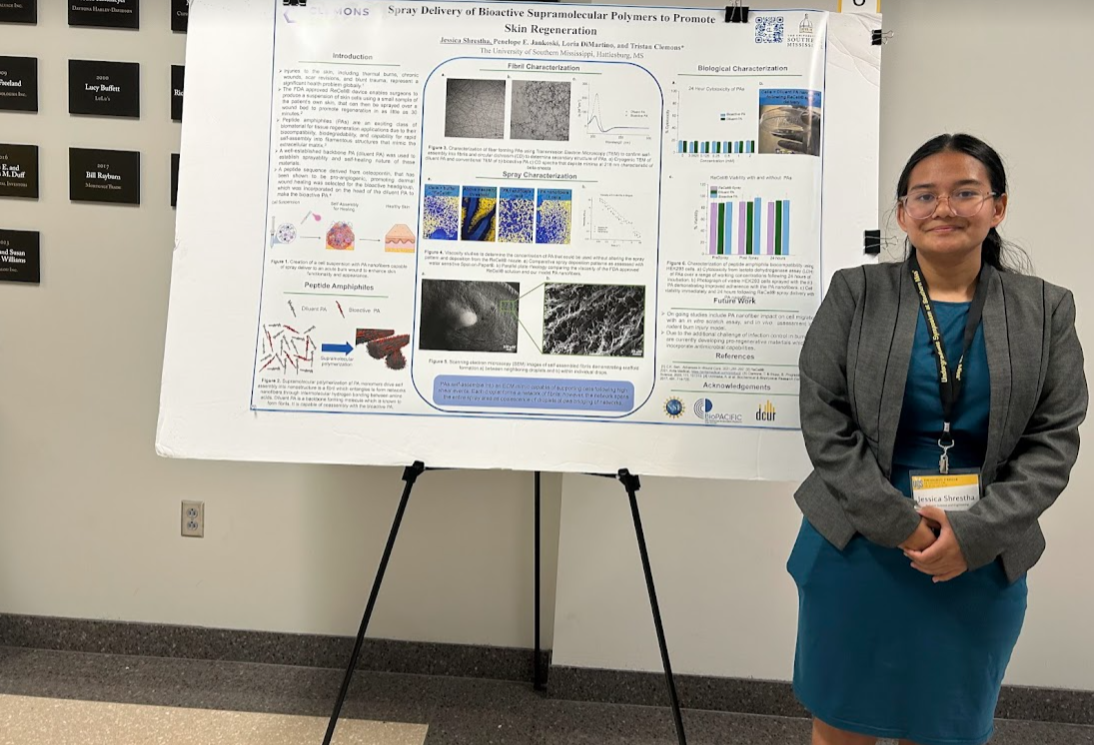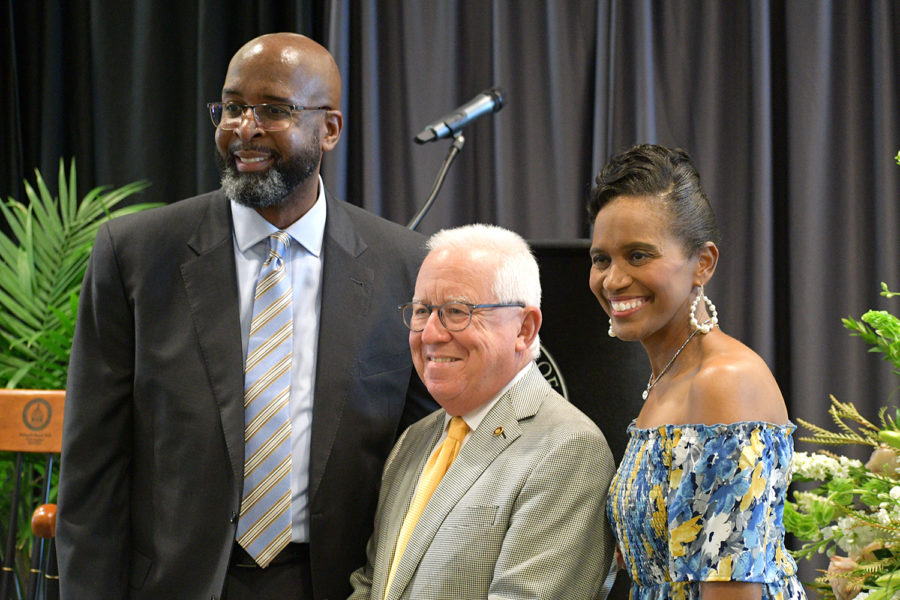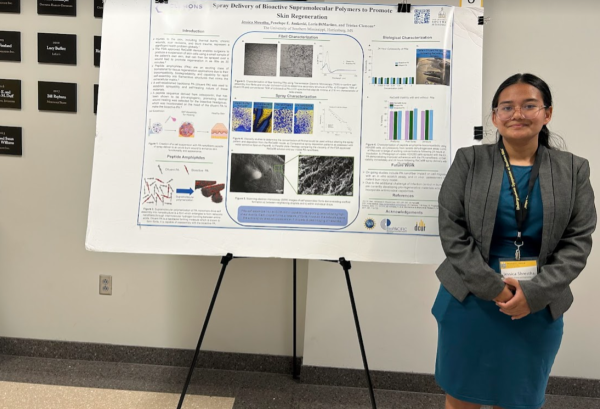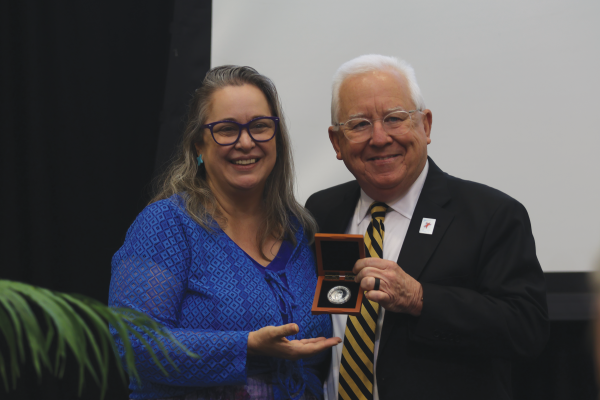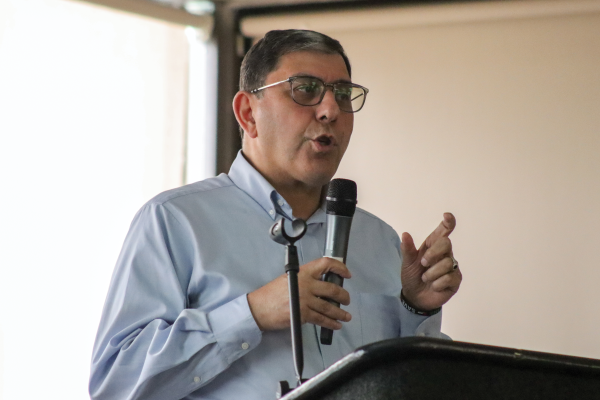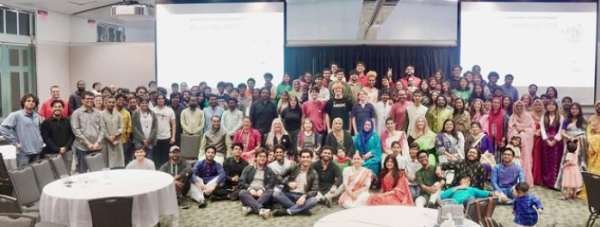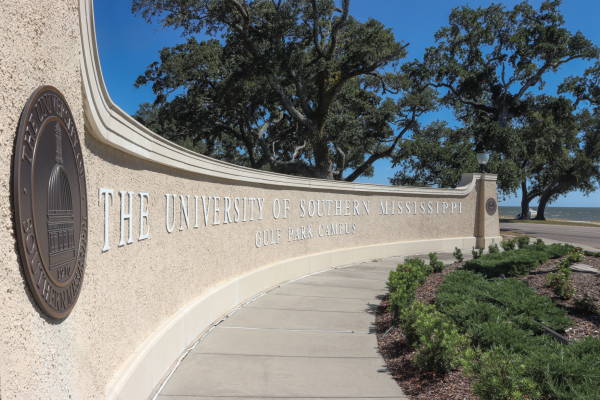Bennett to USM: “A Special Place in My Heart”
Former president Rodney Bennett and wife Temple Bennett flank interim president Joe Paul at a reception for Bennett on Friday, Aug. 19, 2022.
In August, well over 100 people gathered to celebrate hearing a familiar face speak at the University of Southern Mississippi.
The familiar face was former USM President Rodney Bennett. Even though he stepped down as president a month prior, the crowd held onto every word he said.
A crowd of more than 100 USM faculty, staff and administrators came to his reception on August 19. It celebrated what Bennett did as president and in the personal lives of those who attended.
Gordon Cannon, Acting Provost and Senior Vice-President for Academic Affairs, instantly thought of something very personal that Bennett had done.
“He actually became ordained so that he could marry my daughter,” Cannon said. “So, we’re very close.”
Assistant Teaching Professor of Religion Tim Gutmann quickly thought of something as well.
“There’s the research designations, there’s the increase in funding, and there’s leading the university through weather disasters and covid,” Gutmann said.
One of those research designations include recognition as a doctoral university with ‘Very high research activity’ by the Carnegie Classifications of Institutions of Higher Education.
Bennett’s successor, Joseph Paul, is one of his biggest cheerleaders. The interim president believes his impact will remain at USM, no matter what Bennett does next.
“That legacy will only grow, as the university, its students, faculty, staff, and alumni, reap the benefit of your leadership accomplishments well out into a very bright Southern Miss future. Well done my friend, well done,” Paul said.
The former president of USM was very appreciative of the attention and praise he received.
“I was especially pleased with the turnout of people who came to wish Mrs. Bennett and me well as we sort of transition into the next journey of our professional careers,” Bennett said.
The Mississippi Institutions of Higher Learning is now looking for the 11th permanent president of USM.
In an email sent to the campus community, USM President Rodney Bennett informed faculty, staff and students that his last day in office will be July 15, 2022. In January of this year, he shared his intention to explore other professional opportunities in advance of his current contract end date of June 30, 2023.
“It is very important to me that the University is able to begin its leadership transition sooner rather than later, in an effort to preserve the institutional momentum we have worked to sustain over the past decade,” Bennett said in the email. “The University of Southern Mississippi will always hold a special place in my heart – and I will always be excited to hear about all the good things I know are still on the horizon for this institution.”
His email went on to say, “I continue to be so grateful to each of you for all that you have done to advance The University of Southern Mississippi and public higher education across our state over the past 10 years. I remain confident that our collective work will continue to have a profound impact on the lives of young people throughout the region
and beyond, and I could not be more proud of all that we have accomplished, together, during my tenure here.”
Bennett has served as president of USM since February, 2013, days after a tornado seriously damaged a large part of campus. Prior to his presidential status, Bennett was vice-president of student affairs at the University of Georgia. Bennett has also served as Dean of Students at Winthrop University in Rock Hill, South Carolina and Associate Dean of Student Life at Middle Tennessee State University in Murfreesboro, Tennessee. He served as Chair of the University of Georgia Alumni Athletic Association, the NCAA Recertification process and was a member of the on-site committee for the Southern Association of Colleges and Schools.
Bennett received a Doctor of Education in Educational Administration from Tennessee State
University, a Master of Education in Educational Administration and a Bachelor of Science in Mass Communication from Middle Tennessee State.
University President Rodney Bennett accepts Grand Marshal position for Homecoming. University President Rodney Bennett accepts Grand Marshal position for Homecoming. Courtesy of Southern Miss.
Bennett had not moved to the Hattiesburg area yet, as he was transitioning out of his then position at the University of Georgia. He traveled to Mississippi as soon as he was informed of the devastation that the tornado left behind. This turned into his first day serving as USM’s president. Bennett led the clean-up and rebuilding
of damaged parts of campus. He continuously upholds the phrase that encapsulates the campus of this university, “leave it better than you found it.”
Bennett made history by be- coming the first African-American president of a predominantly white Mississippi university and the first in Southern Miss’ presidential lineage. This is the part of Bennett’s legacy that distinguishes him from other presidents.
“Dr. Bennett has built a legacy and built onto the strong history of presidents that have come be- fore him and he has enlightened
and heightened the role of the presidency since his arrival,” Eddie Holloway, retired Dean of Stu- dents and former Vice President for Student Affairs, said.“It always brought me great glee to come to the campus to see how beautiful
it ways, to peek at the dome and see that Bennett was president so I’m hoping that he fares well and he continues to see the University of Southern Mississippi as a place that he in part helped to build upon all of the years of presidency and administration of the university’s past.”
During his time at Southern Miss, he impacted many people in the campus community. One of his first acts of business after com- ing to USM was giving the lowest paid campus workers a raise. In July, 2013, he gave custodians and other workers a raise to $10.10 per hour. “It’s the right thing to do and it will have an impact on the economics of the community,” Bennett said at the time.
Other memorable acts was the donation of his pay raise in 2017 to the USM Foundation for student scholarships. “This scholarship will assist students in attending and completing their education at USM, something for which I feel a strong conviction,” Bennett said at the time. “While I am grateful that USM will keep pace with other research universities in this regard. I am sensitive to the fact that this increase comes at a time when so many employees have not received pay increases, have had positions eliminated or have positions in their units remain unfilled.”
Dr. Bennett has not only financially contributed to his students’ success, but has lended a helping hand to those in need at other institutions as well.
After another tornado devastated parts of south Hattiesburg in 2017, Bennett extended an invitation to students at William Carey University after some of their residence halls and classroom buildings were seriously damaged.
“In the short term, a small group of William Carey students has moved into Hillcrest residence hall, and all William Carey students were invited to dine at no cost at the Fresh Food Company throughout the weekend,” Bennett wrote in an address to campus. “I ask you to join me in welcoming these students as you see them on campus.” William Carey students also attended classes in Joseph Greene Hall and other locations on campus where classrooms were available.
William Carey President Tom- my King presented Bennett with the honorary doctor of humane letters degree.
“Not only because of his open- ing his arms and the arms of his institution to William Carey in our time of need, but for his involvement in the community in so many ways,” King said. “It’s ironic that Dr. Bennett came to USM immediately after the tornado that ravished their campus in 2013. His first duties were to help clean up and rebuild.”
“Under President Rodney D. Bennett’s leadership, the University of Southern Mississippi has made significant gains in student success, in research and academic opportunities, and in our financial stability,” Dee Dee Anderson, USM Vice President of Student Affairs said. “As the President he always fully supported the student experience and the work that we do in Student Affairs to create healthy, connected, learning focused students and communities. His commitment and leadership to Southern Miss will be missed.”
In one of his more controversial moves, Bennett ordered that the state flag, which featured the stars and bars of the Confederate flag, be removed from the front
of campus on Oct 28, 2015. The move came hours before demonstrators were to gather in the front of USM’s Hattiesburg campus to protest the continued flying of the flag. He replaced the state and university flags with two American flags.
A university police officer takes down the Mississippi state flag on the Southern Miss campus this morning. Brittany Stewart/Stu- dent Printz
“I have chosen to raise American flags on all University of Southern Mississippi flagpoles to remind the university community of what unites us. We have all chosen to work, study and live in a country in which debates like those around the state flag of Mississippi can take place and ideas can be civilly expressed and advanced,” said Bennett in an email to students. “While I love the state of Mississippi, there is a passionate disagreement about the current state flag on our campuses and in our communities.
I am looking forward to a time when this debate is resolved and USM raises a state flag that unites us.”
The lowering of the old state flag was met by weekly protests in front of campus by a group of Mississippi residents who believed that state institutions should fly the state flag. Their Sunday afternoon protests lasted 356 weeks. The new state flag was raised on Jan. 12, 2021.
In 2020, Bennett oversaw an academic reorganization that reduced the number of colleges from six to four. It was believed that the reorganization would
help the university by creating heightened efficiencies in process, improved budgetary flexibility for colleges and schools, strengthened climate for research and teach-
ing collaboration, and increased visibility for unique programs and university identities.
The academic colleges were reorganized as the College of
Arts and Letters and the College of Science and Technology were consolidated into the College of Arts and Sciences. The College of Education and Human Sciences is a consolidation of the College of Health and the College of Education and Psychology. The College of Business and Economic Development and College of Nursing and Health Professions are the other two colleges.
University President Rodney Bennett speaks at the prayer breakfast. (Photo/Garret Grove) Throughout his presidency, Bennett has encapsulated his vision for Southern Miss. He wanted it to serve as a model for public high- er education across the United States. The 6 areas of his vision includes: ensuring student success, expanding enrollment strategies, enhancing academic instruction, fostering greater focus on research, bolstering economic and community partnerships and maximizing human potential.
“Every interaction with a student creates an opportunity for you to say or do something that helps create a path toward completion for them. Regardless of your background, once you come to work at Southern Miss, you’re an educator,” Bennett said. “I will expect everybody to see them- selves as a part of the mission of Southern Miss and work to create pathways of completion for students.”
While cultivating his vision, Bennett managed to achieve more than he could have thought possible. More notable achievements include earning the Carnegie Classification of Institutions of Higher Education R1 designation, securing regional accreditation reaffirmations for a wide variety of academic programs and elevating USM’s role as a $663 million annual economic impact on the state of Mississippi.
Your donation will support the student journalists of University of Southern Mississipi. Your contribution will allow us to purchase equipment and cover our annual website hosting costs.


